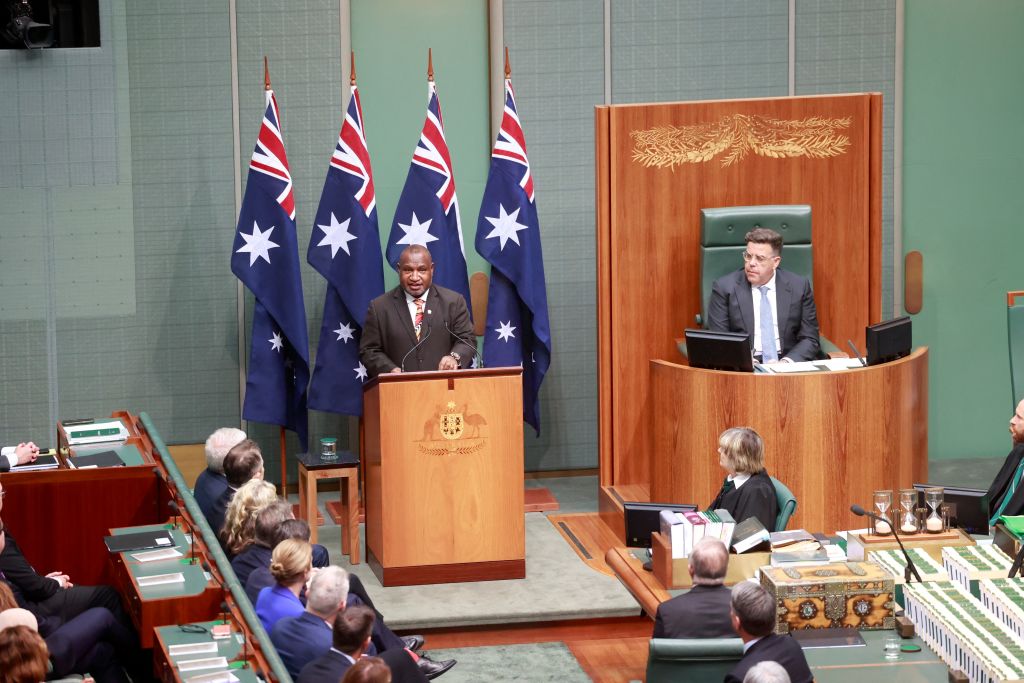
As highlighted by Tuvalu’s recent election and recent political instability in PNG, amongst other countries in the region, Australia’s engagement with Pacific island countries can change suddenly, but our principles and support should firmly be aimed at being constant and long-lasting.
On 8 February, Papua New Guinea Prime Minister James Marape made the first ever address by a Pacific leader to a joint sitting of the Australian Parliament. Marape spoke warmly of the ‘very special and very unique relationship’ that PNG has with Australia. Indeed, many Pacific Island Countries would share a similar sentiment about Australia, New Zealand or the US. He also urged Australia not to ‘give up’ on his country. Giving up on the partnerships we have with our neighbours is not something that many Australians would be considering. Still, Marape’s comment is a strong reminder that during times of change in the Pacific, Australia’s government needs to continue to engage and convince the region that its support is available for the long haul. More broadly, his speech rhetorically signaled a desire to redefine PNG’s relations based on economic independence, however close the two countries remain intertwined.
On Marape’s return to PNG, he was met with a motion of no confidence, which ultimately required a resubmission. Former prime minister Peter O’Neill has been active in the media highlighting concerns over potential corruption in Marape’s government and threats to freedom of speech in new media legislation. Several MPs have also stood down from government following the riots that ignited in Port Moresby in mid-January, questioning the stability of Marape’s position. However, even a change in leadership is unlikely to spell doom for the Australian partnership in PNG, or significantly alter the plans outlined in Australia-PNG Bilateral Security Agreement, signed in December last year. And although Foreign Minister Justin Tkachenko had flagged China’s approach to pursue a security agreement with PNG, there is not grave concern in Canberra that an agreement would be struck that compromises Australia’s interoperability with and support to PNG’s security forces. During his visit to Australia, Marape explicitly distanced himself from the prospect of a new security deal with China.
In other parts of the region; however, Australia’s status as an ‘indispensable partner’—a term invoked by Prime Minister Anthony Albanese during Marape’s visit—may be on less firm ground.
While the newly elected members of Tuvalu’s parliament have yet to arrive in the capital, Funafuti, following last month’s general election, former prime minister Enele Sopoaga has stated that, if he succeeds Kausea Natano as prime minister, he would ‘throw away’ the Falepili Union, a security treaty signed between Australia and Tuvalu in November last year. Re-negotiation of the treaty could see a potential dilution of the current security components, including a security guarantee for the remote island nation, and veto power for Australia on Tuvalu’s other security engagements.
Natano’s failure to be re-elected should not be read as indicating a broad lack of support for the Falepili Union. Instead, it is more likely to reflect that, in Tuvalu, where only 1129 votes were cast in Natano’s Funafuti constituency, truly every vote counts. Natano missed out on re-election by 17 votes, despite receiving a higher percentage of votes in his constituency than he did in 2019 when he scraped by to be elected by just 6 votes.
Still, Australia will need to focus on its engagement with the new Tuvalu government, and make heightened efforts to communicate what the treaty means, both to the government and to the public in Tuvalu. Australia must also be willing to compromise but should not seek to push Tuvalu to compromise on the essential components of the agreement that seek to support combatting the rapidly intensifying climate challenges. And while some MPs in Tuvalu are floating the idea of cutting diplomatic ties with Taiwan in favour of greater Chinese engagement, this should not affect Australia’s ongoing support for the Falepili Union.
The decision whether to diplomatically recognise Taiwan or China is a sovereign choice. The Australian government respects that sovereign right among its partners in the Pacific. However, it is also legitimate for Canberra to express concerns over the potential pressures and challenges that may befall a Pacific island country after switching diplomatic recognition. If we wanted to anticipate what Tuvalu, or Nauru, which recently switched recognition from Taipei to Beijing, could expect from greater CCP engagement, we need only look towards Solomon Islands.
After the Solomon Islands recognised China, in 2019, Beijing provided funding and support for the Pacific Games, which were hosted in Honiara late last year. While the Chinese-built new stadiums look impressive, it is not clear that such largesse from Beijing has brought any long-term benefit to the country. Beyond the new infrastructure in the capital, material support from China also brings political pressure on recipients and restricted freedoms in its wake. An article by local media outlet, In-depth Solomons, highlights these pressures, where emails from a Chinese Embassy official have revealed attempts to obstruct publication of certain articles because they did not align with the narrative of China’s ruling Communist Party. The editors of the newspaper were told to ‘be mindful of (their) publication since China is also a supporter’ of their organisation.
So, while a neutral stance on diplomatic recognition is essential to respecting the sovereignty of Pacific countries, Canberra cannot afford to back off from upholding liberal values such as media freedom when it engages in the region.
The Pacific will continue to be affected by political instability and political change as each country strives towards a democratic solution that best fits their cultural needs and identity. Australia must stay the course and be ready to engage with any elected leader, as well as be prepared to revisit existing agreements and support when needed without compromising on the shared values of the Pacific region. More of our analysis on these recent issues can be listened to, in the latest ASPI podcast episode.

